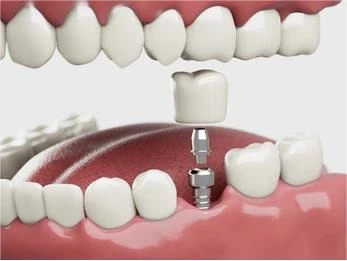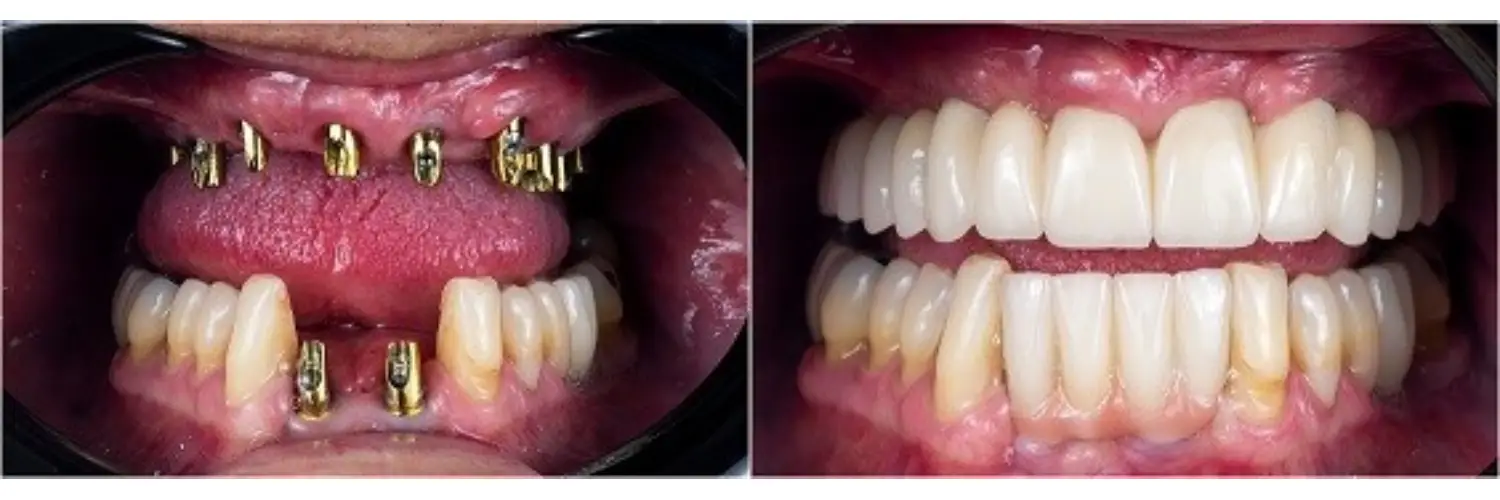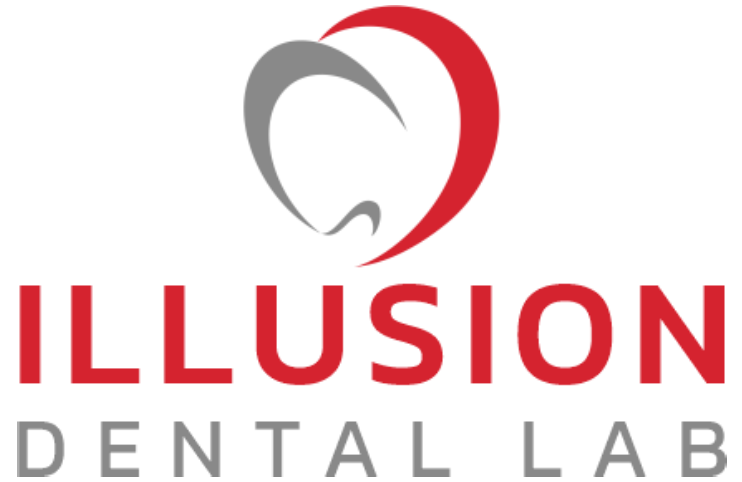Blog Details
Dental Care: An Ultimate Guide for Superior Oral Health

The term “Dental Implants” has now become common knowledge for one and all. Dental implants are gaining fame due to their successful results and many advantages. So basically, Dental implant procedures are a modern artificial tooth option which are favored over crown bridge or denture as they mimic tooth roots. These are more durable and do not require support from the adjacent teeth. They take support from the surrounding bone and offer a stable solution for missing front and back teeth. Let’s discuss all the details about the types, costs, and benefits of dental implant surgery which will increase your knowledge about dental implant procedures.
Everything About Dental Implants You Need to Know?
Dental implants are screw-shaped titanium products that are placed in the jawbone to replace a missing tooth. They are coated with a substance that helps bone formation around them while not interfering with the oral hygiene and keeping the periodontal disease at bay. Once bone is formed around the implant site, they become stable support upon which artificial teeth can be placed. A dental implant offers a stable solution as compared to the removable dentures and can replace one or more lost teeth easily. These artificial teeth function almost like natural teeth unlike other crowns which feel only like tooth replacements.
What are the different types of dental implants available?
| Types of Implants | Description | |
|---|---|---|
| By Material | Titanium dental implants | Most common for durability and compatibility. |
| Zirconia dental implants | Metal-free, ideal for aesthetic purposes. | |
| By Placement or by implant site | Endosteal implant | Placed directly in the jawbone, the most common type of implant. |
| Subperiosteal implant | Placed on top of the jawbone, under the gum tissue, used when there’s insufficient jawbone. | |
| By Full Mouth Dental Implants | All-on-4 | Uses four implants to restore a full set of artificial teeth in one arch. |
| All-on-6 | Uses six implants for a stronger foundation and more support for patients with less bone density. | |
How does one get a dental implant placed?
The dental implant surgery procedure can be explained in a few simple steps as follows:
To get a dental implant, the first step is to visit a dentist and get an oral health checkup like presence of periodontal disease, status of oral hygiene etc
They will take the necessary X-rays and assess implant site, if there is enough space to place an implant which replaces the tooth roots.
Once your treatment is planned and explained, they will go ahead and fix the date and time for the surgical procedures.
On the day of the dental implant surgery, the tooth roots will be replaced by placing the implant in the jawbone, and sutures will be given to close the surgical procedures site.
A healing period of approximately 3-4 months is taken for the implant to fuse with the bone, support the implant, and get long term success.
After the waiting period, an artificial tooth is attached to the implant abutment and placed onto the dental implant and the missing tooth is finally restored.
If proper oral hygiene isn’t maintained, then implant failure may occur, requiring further surgical procedures.
The dentist may call you for a follow-up every 6 months to check on the implant and its surrounding structures to avoid implant failure, which will result in further surgical procedures to support the dental implant procedure.
When and Why a Patient May Need Full Mouth Dental Implant Surgery?
Recommended for patients who have lost most or all of their teeth. Provides a permanent solution for those looking to restore full functionality and aesthetics. Dental implant surgery is perfect for patients who cannot accept crown bridge or denture.
Benefits of Full Mouth Implants:
- Restores complete chewing function and smile.
- More stable than crown bridges or dentures.
- Prevents bone loss in the jaw by using bone substitutes if required.
- Improves overall oral health and self-confidence.
- Regular dental checkups can help check early signs of implant failure to promote long term success.
Dental bridge vs implant:
| Aspect | Dental Bridge | Dental Implants |
|---|---|---|
| Solution Type & Dependency | Fixed solution that bridges the gap using adjacent healthy teeth as anchors. | Individual implants for each missing tooth or full-arch restoration. |
| Effect on Adjacent Teeth | Requires the alteration of neighboring teeth. | Does not affect healthy adjacent teeth. |
| Cost | Less expensive but may not last as long as implants. | More expensive but longer lasting and more durable as they replace tooth roots. |
| Longevity | May need replacement over time. | Long-lasting with proper care. |
| Stability | Provides stable support but may not be as strong as implants in the long run. | Highly stable and strong, mimicking natural tooth roots. Hence, less chances of implant failure. |
Do you know the average Dental Implant Cost in India?
Single Dental Implant Cost:
Titanium Implant:The cost can vary based on factors like the quality of the titanium, the clinic’s location, and the expertise of the dental surgeon. The reputation of the clinic and any additional services, such as consultations or follow-up appointments, can also influence pricing.
Zirconia Implant:The cost of zirconia implants is generally higher due to the material's advanced properties and aesthetic qualities. The pricing may be affected by the material quality, the complexity of the procedure, and the location of the clinic.
Additional Costs:
Abutment (Post):The abutment’s cost can vary based on the material used (metal, ceramic, or zirconia) and the type of dental implant. The complexity of the case, including whether the surgical procedure site requires additional treatment like bone substitutes, can also affect the cost.
Crown (Tooth Cap):The cost of the artificial tooth depends on the material (e.g., porcelain, ceramic, or metal) and the design. Custom-made dental crowns or those requiring advanced techniques, like CAD/CAM technology, can lead to higher prices.
Full-Mouth Dental Implants Cost (All-on-4 or All-on-6):
All-on-4 (per arch):The cost depends on factors like the type of implants used, the materials chosen for the artificial teeth, and the complexity of dental implant surgery. Geographic location, surgeon's experience, and the need for additional treatments (e.g., bone substitutes / bone grafts) can influence the cost.
All-on-6 (per arch):The cost varies depending on similar factors as the All-on-4 procedure but is typically higher due to the additional implants. The complexity of the case, such as the condition of the jawbone, also impacts pricing.
Additional Costs:
X-rays/CT Scan:The cost of imaging can vary depending on the technology used, such as 3D imaging versus traditional X-rays. Some clinics may offer packages that include imaging as part of the treatment cost.
Temporary Denture or Prosthesis:If required, the cost for crown bridge or removable dentures depends on the materials and design. High-quality temporary solutions, artificial teeth or any other type of tooth replacements may lead to higher prices.
Total for Full-Mouth (Both Arches):
All-on-4 dental implants:The total cost for full-mouth restoration can vary based on the number of implants, the materials used, and additional surgical procedures like usage of bone substitutes or sinus lifts.
All-on-6 dental implants:Similar to All-on-4, the total cost can vary depending on the specifics of the patient’s dental and medical condition, the expertise of the surgeon, and any additional treatments required to support the implant.
Dental Implants Before and After

The above case is an excellent example of both implant supported bridge and full arch implants. The lower front teeth which are missing have been replaced with a bridge that supports the implant whereas all the missing teeth in the upper arch have been restored using full arch implants. An entire dental makeover is visible before and after the dental implant surgery has been completed. The person looks younger and has improved chewing ability, speech, and smile.
Hopefully all your concerns about the dental implant surgery steps have been resolved by reading the above blog and you are ready to replace your missing teeth with an artificial tooth with confidence. For any further assistance or guidance, it is best to ask your dentist. Now take the steps towards filling those gaps left by missing teeth with artificial teeth and ensure a better future for your dental health.





